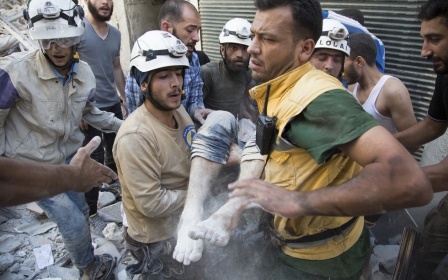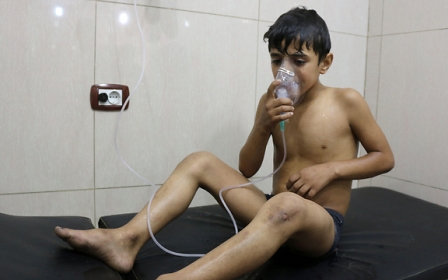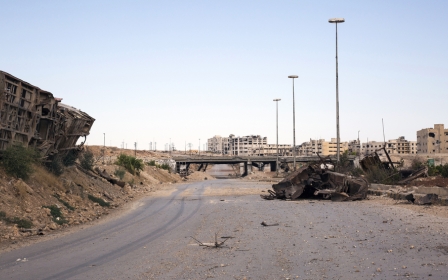Rebels warn Syria truce 'will not hold out' with aid still stuck at border

Syria's ceasefire "will not hold out," a senior rebel official in Aleppo warned on Saturday, as air strikes and shelling continued in some places and promised aid deliveries failed to come through.
The ceasefire is the result of an agreement between Russia, which backs Syrian President Bashar al-Assad, and the United States, which supports some rebel groups.
It has successfully cooled fighting - but Russia's defence ministry said on Saturday that the ceasefire had been broken 199 times since coming into effect last Sunday night.
Russia's foreign minister Sergei Lavrov spoke to his US counterpart John Kerry by phone on Saturday.
Lavrov said he had asked for US military officials to take part alongside Russia in observing the ceasefire.
Lavrov also said he had asked the US to do more to ensure that aid can be delivered to besieged areas of Syria.
The Russian defence ministry had earlier pledged that aid would be delivered to the rebel-held Damascus suburb of Maadhamiyat al-Sham on Sunday.
But the statement did not mention rebel-held areas of Aleppo, which have not received aid since the ceasefire began due to ongoing tensions around the key supply route into the city.
Russian president Vladimir Putin on Saturday cast doubt on the pause in fighting, accusing rebels of exploiting the truce to "regroup".
He also accused Washington of being unable to "differentiate between opposition sites and terrorist sites" - the two sides had planned to establish a joint operations room to target groups they both consider terrorist, including Islamic State, if the truce lasted beyond a week.
Despite his comments, Putin also sounded a positive note on the ceasefire on Saturday morning, saying in a televised interview that Moscow and Washington have "a shared goal".
On Friday, Washington and Moscow agreed to extend the ceasefire.
However, a UN Security Council meeting scheduled for Saturday and billed as the "last chance" for reaching an agreement was scrapped at the las minute after the US and Russia failed to agree about whether to release the details of the ceasefire deal.
Rebels say they only reluctantly accepted the initial deal, which they believe is skewed against them, because it could relieve the dire humanitarian situation in besieged areas they control, including in eastern Aleppo.
"The truce, as we have warned - and we told the [US] State Department - will not hold out," the rebel official said, pointing to the continued presence of a UN aid convoy at the Turkish border awaiting permission to travel to Aleppo.
"It is not possible for the party that wages war against a people to strive to achieve a truce, as it is also not possible for it to be a sponsor of this agreement while it bombs night and day, while on the other side, the other party - America - has the role of spectator," he said.
US special forces were forced to flee the northern town of al-Rais on Friday after fighters from the Free Syrian Army, which includes some US-backed factions, threatened to "slaughter" them for "invading" the town.
Moscow has itself accused rebels of breaking the truce and said Washington needs to do more to make them abide by its terms, including separating from the hardline Jabhat Fateh al-Sham, which only broke formal allegiance to al-Qaeda in July when it changed its name from al-Nusra Front.
Both sides have accused the other of being responsible for aid deliveries being stuck far from Aleppo, where army and rebel forces were supposed to retire from the Castello Road, which leads into besieged, rebel-held eastern districts.
Russia on Friday said the Syrian army had initially withdrawn but returned to its positions after being fired on by rebels, who in turn say they saw no sign of government forces ever leaving their positions.
The United Nations pointed the finger at the government for holding up aid by denying letters guaranteeing access.
Warplanes strafed or bombed rebel-held areas in Maarat al-Numan, Saraqeb and Khan Sheikhoun in Idlib, Teir Maalah, north of Homs, and Souha, east of Hama, overnight after other strikes earlier on Friday, the Syrian Observatory for Human Rights said.
The Britain-based war monitoring group also reported clashes between the army and rebels or shelling overnight in the capital's Eastern Ghouta suburbs, in Sanaisil and Jawalik, north of Homs, al-Eis and Ramousah, south of Aleppo and Ibta in Deraa.
New MEE newsletter: Jerusalem Dispatch
Sign up to get the latest insights and analysis on Israel-Palestine, alongside Turkey Unpacked and other MEE newsletters
Middle East Eye delivers independent and unrivalled coverage and analysis of the Middle East, North Africa and beyond. To learn more about republishing this content and the associated fees, please fill out this form. More about MEE can be found here.




